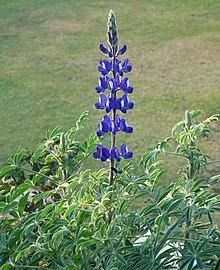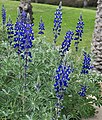Lupinus pilosus
| Lupinus pilosus | |
|---|---|

| |
| Scientific classification | |
| Kingdom: | Plantae |
| Clade: | Tracheophytes |
| Clade: | Angiosperms |
| Clade: | Eudicots |
| Clade: | Rosids |
| Order: | Fabales |
| Family: | Fabaceae |
| Subfamily: | Faboideae |
| Genus: | Lupinus |
| Species: | L. pilosus
|
| Binomial name | |
| Lupinus pilosus | |
| Synonyms | |
| |
Lupinus pilosus, commonly known as blue lupine, (Template:Lang-he, Template:Lang-ar) is a species of flowering plant that is edible from the family Fabaceae that grows in Mediterranean scrubland. It has a 30–70 centimetres (12–28 in) long stem and 3–8 centimetres (1.2–3.1 in) long legume. The species blooms from February to May.[1] The species have white coloured flowers which are 1–1.5 centimetres (0.39–0.59 in) long and pods the diameter of which is 3–8 centimetres (1.2–3.1 in).[2] In Israel the Lupinus pilosus has blue flowers with white vertical spot at the middle.
Culinary uses
Around the South Tyrolean village of Altrei (Anterivo), L. pilosus was historically grown. The seeds were roasted and mixed with malt grains and infused in boiling water to produce a coffee-like but caffeine-free hot beverage, Altreier Kaffee ("Altrei coffee"). Interesting not only from a cultural and historical but also from a botanical standpoint, since 2006 a local initiative is re-establishing L. pilosus cultivation in the Altrei region to revive this culinary specialty.[citation needed]
In Israel, the plant is numbered among the few, wild edible plants, but the seeds still require leaching in boiling water several times (with replacement of the water) for the seeds to become palatable.[3] The seeds are then roasted in a skillet with a dash of water, salted, and eaten.[3] Some have it as their practice to pulverize the prepared seeds and to mix them with wheat or sorghum flour for bread.[3]
Gallery
-
Blue Lupine in Kefar Shemaryahu, Israel
-
Blue Lupine in Tel Socho of the Elah Valley
-
Carpets of blue Lupinus pilosus in Israel
-
Lupinus pilosus in Israel
References
- ^ "Lupinus pilosus L." Flowers in Israel. Retrieved November 5, 2013.
- ^ "Lupinus pilosus". Royal Botanic Garden. Archived from the original on February 2, 2014. Retrieved November 5, 2013.
- ^ a b c Dalman, Gustaf (2020). Nadia Abdulhadi-Sukhtian (ed.). Work and Customs in Palestine, volume II. Vol. 2 (Agriculture). Translated by Robert Schick. Ramallah: Dar Al Nasher. p. 321. ISBN 978-9950-385-84-9.
External links
- Lupinus pilosus at FlowersInIsrael.com
- Lupinus pilosus תורמוס ההרים at Wildflowers.com (in Hebrew)
- Lupinus pilosus in Israel at Flickr




